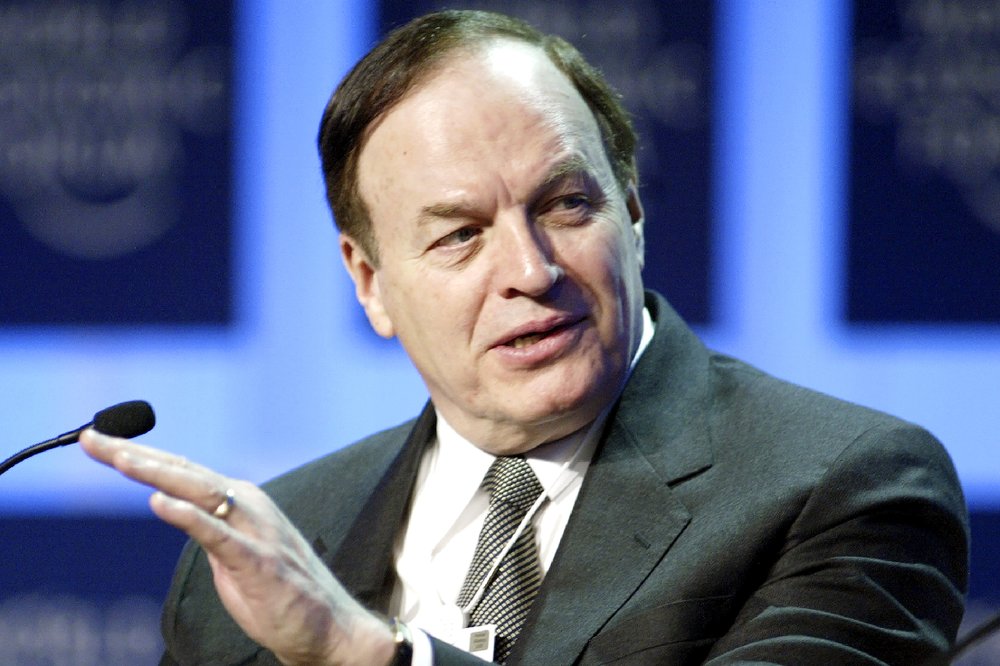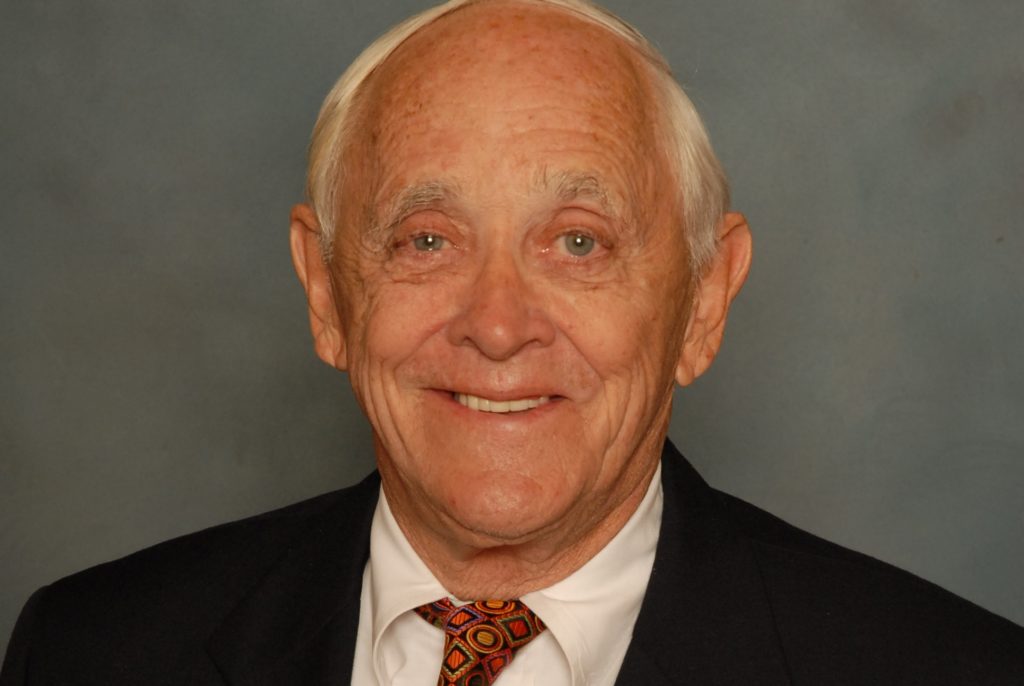Judge Randy Jinks booted for racist, inappropriate behavior

A judge who oversees elections in an Alabama county was removed from office after being accused of racist, sexually inappropriate behavior that included demeaning comments about women and saying George Floyd “got what he deserved” when an officer in Minnesota murdered him. Talladega County Probate Judge Randy Jinks, 65, was ousted in a unanimous order filed Friday by the nine-member Alabama Court of the Judiciary. Following a trial, the panel found that he violated five judicial ethics rules including failing to uphold the integrity and independence of the court system. A former business owner who served as chairman of the county Republican executive committee, Jinks denied most of the claims, blamed workers for misinterpreting jokes, and accused employees of eavesdropping, court records showed. Jinks, who doesn’t have a law license, was first elected in 2018 and took office the following year. His conduct was the subject of a complaint filed in March that accused him of watching and sharing sexually inappropriate videos and making comments about the appearance and anatomy of women. Jinks also mouthed the n-word when referring to Black people, including during Black Lives Matter demonstrations, and told a deputy clerk that Black people get benefits and welfare “because of the color of their skin” that don’t go to white people, the complaint said. Jinks made multiple racist comments after Minneapolis police killed Floyd, a Black man whose death became a rallying point for protests nationally, including calling the victim “just another thug” and saying “he pretty much got what he deserved,” the complaint said. The court found that after Jinks saw a new automobile purchased by the only Black employee in the probate office, he remarked: “I seen that car. I can’t even — I’m the judge and I can’t even afford a Mercedes. What you doing, selling drugs?” Jinks also improperly tried to help a woman get an early release from a prison sentence imposed in a neighboring county, the court found. Jinks denied the allegations, and his lawyer released a statement to media outlets saying his remarks were taken “completely out of context” and viewed in a way to make Jinks look as bad as possible. The ruling can be appealed to the Alabama Supreme Court. Located east of Birmingham, Talladega County has about 80,000 residents. Jinks’ duties under state law included supervising elections in the county, and he also handled probate matters including wills. Probate judges under state law are not required to be attorneys. Jinks was elected to the Talladega County Commission in 1986 and worked six years on the staff of former Rep. Bob Riley, who later served two terms as Alabama governor. Republished with the permission of the Associated Press.
Alabama senator Richard Shelby has indicated he won’t run again

U.S. Sen. Richard C. Shelby of Alabama, the Senate’s fourth most senior member, has told confidants that he does not intend to run for reelection next year_— prompting some Republicans to urge the powerful, establishment politician to reconsider, even as potential replacements prepare to run for his seat. The senator in recent weeks told one close Alabama ally that he was not planning on running in 2022 for what would be his seventh term, according to the ally, who was not authorized to discuss the matter and spoke with The Associated Press on condition of anonymity. The person said some in the state were still trying to get Shelby to change his mind out of concern about losing clout and worries that the senator might be replaced by a fringe candidate who would not be as effective. Shelby spokeswoman Blair Taylor said Friday that the senator has not made a decision, “but there will likely be an announcement forthcoming in the next few weeks.” “As I previously stated, the Senator has not made a decision or an announcement regarding whether or not he plans to run in 2022. Any speculation is just that, speculation,” Taylor wrote in an email Friday. A titan of Alabama politics, the 86-year-old politician has spent 42 years in Washington, serving first in the House before the Senate. His stepping down would leave a power void for the region. It would also set off a free-for-all primary in a national party deeply divided between traditional Republicans like Shelby and those who model themselves on former President Donald Trump. Shelby was elected to the Senate in 1986 as a conservative Democrat during the party’s waning days of power in the Deep South, but he switched to the GOP in 1994. He’s spent the past two years as chairman of the Senate Appropriations Committee before Democrats gained control of the chamber. All along, he has used his influence to benefit the state’s interests, particularly ports and military manufacturers. He played a key role in bringing an FBI campus and the newly announced Space Command to Huntsville. “I don’t know anybody who knows how to wield power like Shelby does,” said David Mowery, an Alabama-based political consultant. “I would say that is his greatest accomplishment, to get money allocated to the state for many different projects,” former Alabama Republican Party Chairman Bill Armistead said. Alabama’s political circles have long braced for a Shelby retirement. Armistead said the senator told him during his 2016 bid for reelection that it was his last campaign, but Armistead added the caveat that, “Things change.” Several months ago, Shelby told a group of business leaders at a private meeting that he would retire rather than run again, according to a person in attendance who was not authorized to discuss the event and also spoke on condition of anonymity. A list of potential GOP replacements is waiting in the wings. Possible candidates include Shelby’s former chief of staff, Katie Boyd Britt, who now heads an influential business lobby and who would likely have the senator’s backing if she decided to enter the race. Alabama Secretary of State John Merrill, who suspended his 2020 Senate campaign when former Attorney General Jeff Sessions jumped in the race, said he would consider a run. Rep. Mo Brooks is also expected to eye the seat. Brooks has faced criticism for his role in the Jan. 6 siege at the U.S. Capitol. At a rally before the deadly riot, he told the crowd it was time for “taking down names and kicking ass,” but has maintained since that he was talking about fighting at the ballot box. Brooks declined to comment. Britt did not immediately respond to a text message and a message on social media. Shelby could use his power to give his preferred successor a boost. The senator has gone much of his career without serious opposition and has nearly $10 million in campaign money that he could throw toward his candidate of choice. Still, the GOP primary could serve as a microcosm of the larger national tug of war over the direction of the Republican Party. While Shelby has amassed a conservative voting record, the measured Republican senator has not embraced the bombastic populist style of Trump and Trump-like candidates. “I think it would be a total free-for-all,” said Mowery. Shelby was one of the last of the “old style-Southern politicians who saw as their main job as to steer as much of the federal budget to the state, instead of jumping on the hot-button issue of the day,” Mowery said. In 2017, Shelby bucked his party when he announced that he could not support Republican Roy Moore, who faced sexual misconduct allegations, in the special election for Alabama’s other Senate seat. “You’ll have a lot of candidates that will try to be as loud or as dumb as possible because they think that is what plays to 50% or more of the Republican electorate — not realizing that’s not how you get things done in Washington,” Mowery said. Some prominent state figures are still hoping that Shelby will reconsider. “I hope he will run again. I don’t think there is anyone who has meant more to the state of Alabama in that position in my lifetime,” former Gov. Bob Riley said. ___ This story has been edited to correct that Bill Armistead is the former chairman of the Alabama Republican Party. Republished with the permission of the Associated Press.
Steve Flowers: Mike Hubbard conviction finally upheld

It looks like Mike Hubbard’s day of reckoning may be coming near.
Lawmakers approve $1.25 billion school bond issue

Kay Ivey proposed the bond issue in her State of the State address earlier this year.
Inside the Statehouse: Budget is priority number one for legislative session

Steve Flowers discusses the unique ongoing legislative session and lists a who’s who in our budgetary process.
Alabama lawmakers advance pared down budgets amid COVID-19

The House Ways and Means Education Committee advanced a $7.2 billion education budget that skips a 3% pay raise lawmakers had hoped to give teachers and public school employees.
Kay Ivey proposes $1 billion school bond issue

Ivey first announced the project in her State of the State address on Tuesday night.
Rauf Bolden: Opposing taxation without representation

“It is all about the money. “Money to get the power, power to keep the money,” according to Machiavelli’s patron Lorenzo di Piero de’ Medici. Orange Beach has the power to tax people living outside the corporate limits, and the power to keep the money without allowing them to vote. State Sen. Chris Elliot – Republican, and Gerald Allen – Republican propose doing something about it. Their answer is Alabama Legislation SB19 & SB23. “S23 [SB23 is] a good idea in some respects; however AL is only state in US which grants as much authority to public officials without opportunity to vote on those officials! A complicated issue which has taken lot of legislative time with no good solution!” said Alabama State Rep. Steve McMillan (Republican-Gulf Shores) in an email. Both pieces of legislation argue that a person should have the right to vote for the people who levy taxes, require business licenses, and handle law enforcement in their jurisdiction. It all seems reasonable to me. Orange Beach Mayor Tony Kennon does not agree. Resolutions opposing the senators’ legislation passed unanimously in the Council Chambers on March 19th, according to a recording on the city’s web site, approximately at time index: 14:30. • “Resolution opposing proposed SB19, and opposing any action by the Alabama Legislature that would exempt certain vacation, short-term rentals from lodgings taxes [13%],” according to item 11 on the Agenda’s website. • “Resolution opposing proposed SB23 [], and opposing any action by the Alabama Legislature that would restrict or remove municipal police or planning jurisdictions,” according to item 10 on the Agenda’s website. I reached out to Orange Beach’s Legal Administrator, asking why quashing SB19 & SB23 is so important to the city. Their office did not respond to my request for comment. “Rumor has it the House [Alabama] is blocking the legislation [SB19 & SB23] and it will never pass. City lobbyists deeply involved. Monies from police jurisdictions too valuable to lose,” said Ernie Church in a Facebook Group, End The #Bridge2Nowhere. The legislation SB19 tackles eliminating unfair hospitality taxes. “Transient occupancy tax (lodging tax), not applicable to tent camping, marine ships, and recreational vehicles, Sec. 40-26-1 am’d,” according to a report on LegiScan. Similarly, SB23 seeks to dispose of outside-the-city mercantile taxes, “Municipalities, police jurisdiction and planning jurisdiction, limited to property within corporate limits, provisions for business licenses and sales taxes outside of corporate limits repealed, Secs. 11-51-90, 11-51-206 repealed; Secs. 11-40-10, 11-52-30 am’d,” according to a report on LegiScan. We are looking for clarity, but there is no distinct path forward. Legislators will need consensus, and a willingness to see past a small municipalities’ obsession with the power they hold over their neighbors in the police jurisdictions (PJ). The State of Alabama should demand Orange Beach seed authority to the people who live in the PJ (north of the canal), or incorporate them into their municipality, changing the electoral map forever. Police Jurisdiction of Orange Beach (populated areas outlined in orange north of the canal). Source: See Orange Beach GIS Website. Population of Orange Beach (inside city limits, south of the canal). Source: See Google Public Data. The unfairness of a small group of people having political leverage over the lives of individuals living in the unincorporated areas north of Orange Beach is unsustainable. Mayor Tony Kennon’s resolutions argue for the status quo, ostensibly keeping as much money as possible in the city’s coffers, simultaneously oppressing the voters living outside the city limits.Have the people on the North Shore finally woken up to this power grab?Supporters of the Elliott-Allen Legislation (SB19 & SB23) need the muscle of existing regulations, arguing cities have not adhered to the present rules. Thereby freeing the unincorporated from the constraints of extraterritorial taxation. The requirements are clear, according to the Alabama Department of Revenue. The stipulations for posting Ordinances and maps on the website are quoted below: 1. Copy of the 30-Day Notice that was posted for the following police jurisdiction related ordinances passed on or after 9/1/15: • Ordinances enforcing police or sanitary regulations and prescribing fines and penalties for violations thereof within the police jurisdiction.• Ordinances to fix and collect licenses for any business, trade, or profession done within the police jurisdiction.• Ordinances to levy and assess taxes within the police jurisdiction. 2. Map showing the boundaries of the municipal limits and police jurisdiction: • Due no later than the first day of January in each year.• Maps in PDF or JPG are preferred. Not many Alabama Cities are in compliance. It can be argued that municipal non-compliance automatically exonerates residents from paying taxes. Although this position will be challenged. Citizen complaints should be reported to Alabama Revenue: LocalTaxUnit@revenue.alabama.gov, or faxed to 334-353-7666. I wrote Senator Gerald Allen (R-Tuscaloosa) who sponsored SB19, asking for comment. “Senator Allen [R] will be making public comments when the bill is placed in Committee,” according to an email from Luanne Miller of the Senator’s office. The key issue is getting both these pieces of legislation passed by the Alabama Senate and House. Then signed into law by Governor Kay Ivey. Orange Beach’s lobbyist former Governor Bob Riley will be hard at work, whispering in ears, and twisting arms. If the bills pass, Orange Beach will not have jurisdiction over the North Shore. No planning jurisdiction means no Wolf Bay Bridge. I reached out to Senator Chris Elliott (Republican-Baldwin County). He sponsored SB23. The senator’s office did not respond to my request for comment. Mayor Tony Kennon will fight, saying we do not need to make any changes, supported by his resolutions opposing a refresh. He may argue the city provides services across the canal, including fire and police protection for the residents. Therefore, Orange Beach should keep its extraterritorial jurisdiction as a matter of public safety. Since incorporation in 1984 no Fire Station or Police Precinct House has been built on the North Shore. The public safety argument is nothing more than a smokescreen for keeping the present state of
Five things you need to know about Gerald Dial

The primary elections are over, but some highly sought spots still remain open due to the primary races resulting in runoffs. One of those races is for the Commissioner of Agriculture and Industries seat. Incumbent Agricultural Commissioner John McMillan announced in January he would not be seeking reelection, opting for a run for State Treasurer instead. Four candidates stepped-up to the plate seeking election in the June 5 Republican primary. Former state Sen. Gerald Dial and Lowndesboro Mayor Rick Pate both garnered enough support to tip the race into a a runoff election set for July 17. With that in mind, here are the five things you need to know about Gerald Dial: 1. He served 37 years in the military, retiring in 1997 as an Assistant Adjutant General of the Alabama National Guard Dial joined the Alabama National Guard in 1959, over the course of his 37 year career in the military he attended the Alabama Military Academy and the Engineering Officers Basic Course. In 1968 he also completed the rigorous training required to become a United States Army Ranger, and was ranked as the Assistant Adjutant General of the Alabama National Guard when he retired in 1997. 2. He served in the state legislature as both a senator and a representative. In 1974 Dial was elected to serve as a Representative to the Alabama House, a position he held for one term. After his term as a representative, Dial sought election to the Alabama State Senate District 13 in 1983 and won. He then held his position until 2006 coming back to the race in 2010 to win the district back. This year, instead of seeking re-election, he’s joined the race for Agricultural Commissioner citing his 44 years of service in the Alabama Legislature as enough experience for the job. 3. He’s currently one of the President’s pro tempore at Troy University. Then governor Guy Hunt appointed Dial to the Troy University Board of Trustees in 1991 where he now serves as President pro tempore for Area 5. “Sen. Gerald Dial is one of the best public servants that I have met throughout my life in Alabama,” Troy Chancellor Dr. Jack Hawkins Jr. told the Trojan News Center. “For 26 years he has served as a member of the Troy University Board of Trustees and he has served well. Leadership in its truest sense is about pulling people together and focusing them in a common direction. Sen. Dial is the essence of a servant leader and one of whom we can all be proud.” 4. He was appointed by former governor Bob Riley to serve as the Executive Director of the Alabama Rural Action Commission. Dial served as the Executive director of the Alabama rural action commission from 2007 to early 2018, he was appointed for the position by then governor Bob Riley. According to his campaign website, while serving in this position, Dial “helped secure grants for infrastructure improvements, rural broadband initiatives, and community development.” 5. He financed his campaign through his timber business Pate, Dial’s opponent claimed he was the only farmer in the primary race, but Dial says that’s not true. “I am a farmer as well,” Dial told AL.com. “I financed my campaign off of timber.”
Five things you need to know about Sarah Stewart

The primary elections are over, but some highly sought spots still remain open due to the primary races resulting in runoffs. One of those races is for the Supreme Court, Place 1. Incumbent Brad Mendheim and Thirteenth Judicial Circuit Court Judge Sarah Stewart both garnered enough support to tip the race into a runoff election set for July 17. With that in mind, here are five things you need to know about Sarah Stewart: 1. She was appointed by former-Governor Bob Riley. Stewart was initially appointed to her current position in 2006 by former-Gov. Bob Riley. Later that year she ran without opposition and was elected. She ran again in 2010, winning her first full six-year term. In 2016 she was reelected again, making 2018 the her twelfth year in her current position, 2. Before becoming a circuit judge, she practiced law for fourteen years. Born in Fort Smith, Ark. Stewart attended the University of Arkansas, graduating in 1986 with a Master’s degree and continuing to Vanderbilt University School of Law obtaining her J.D. in 1992. She then practiced with Hand Arendall and Ezell Sharbrough LLC in Mobile, Ala,, later joining Stewart & Hicks P.C. as a senior partner until she was appointed into her current position. 3. She’s the Vice-President Alabama Circuit Judges Association. Stewart has been a major influence in the Alabama Circuit Judges Association since 2009 when she became a board member. She’s held several positions in the association since then, including serving as the Education Chair since 2011, Secretary-Treasurer from 2016 to 2017, and presently as the Vice-President of the association. She has also been a member of several other judicial and legal committees, including the Rules of Evidence Committee, the Alabama State Bar Judicial Liaison Committee, and the Alabama Judicial Caseload Study Committee. 4. She has completed over 1800 criminal and civil cases per year as a circuit judge. Over the course of her over a decade long judgeship, Stewart has disposed of more than 1800 criminal and civil court cases every year. After a controversial ruling earlier this year, Stewart told Yellowhammer News that she “tries to adhere to the law and higher court precedent — even when she might not prefer the result,” saying “sometimes as a judge, you have to sign off on an opinion you don’t personally agree with because that’s the law.” “Judges are referees, not policymakers,” Stewart continued. 5. She’s been an active member of several non-profit organizations. In addition to serving on many judicial committees and boards, Stewart has been actively involving herself in her community. She has served whole-heartedly on several non-profit boards in the Mobile area, including the Girl Scouts of Southern Alabama Board, Loaves and Fishes Ministry 15th Place Homeless Day Service Shelter board, and is and active member of the Junior League of Mobile.
Five things you need to know about Troy King

The primary elections are over, but some highly sought spots still remain open due to the primary races resulting in runoffs. One of those races is for the Attorney General’s seat. In a highly contested and publicized race, Incumbent Steve Marshall and former Alabama Attorney General Troy King both garnered enough support to tip the race into a a runoff election set for July 17. With that in mind, here are five things you need to know about Troy King: 1. He was Alabama’s Attorney General in from 2004 to 2010. It’s safe to say King knows a thing or two about the day-to-day proceedings of the Alabama Attorney General’s office. He was first appointed attorney general in 2004 by former Gov. Bob Riley, after William Pryor left the office to accept federal judge position with the Eleventh Circuit Court of Appeals. In 2006, King defeated democratic nominee John M. Tyson in the November general election of that year. He served as Attorney General for one term after his election, and was defeated by Luther Strange in the 2010 Republican primary; but now he’s back and ready to ultimately find victory as the Party’s nominee. 2. He was instrumental in bringing changes to the Yellowhammer State’s sex offender laws. While serving as Attorney General, King made it his mission to bring new laws regarding sex offenders to the state. Specifically he wanted the state to require that Alabama’s sex offenders who were released wear an electronic monitoring bracelet (such as those used for those on house arrest or parole) to monitor the sex offenders whereabouts. He was so adamant about his position that he wore an electronic monitoring bracelet himself during the 2005 legislative session, until the law was changed. 3. Although he is very opposed to gambling of any kind in Alabama, he’s accepted campaign donations from out of state gambling interests. During his time as Attorney General, not only did he introduce anti-gambling legislation every year of his time in public office, he also prosecuted several electronic gambling sites, opposed a gambling expansion for the Native American tribes in Alabama, and even requested that the United States Department of the Interior deny the Poarch Band of Creek Indian’s application to broaden their gambling operations in the state. But a recent report by AL.com claims King has received “about $90,000 from five South Carolina companies and individuals with links to gaming.” According to the report, one of the major donors from South Carolina, Keith Gray, is involved in the gambling business, with one of his businesses being prosecuted in 2017 by the state of Alabama. Gray reportedly used his own name, names of family members, and business associates to donate to King’s campaign, including two companies called Open Ocean Investments and Sycamore Investments. Which have, “disconnected phone numbers, [and] share a post office box in Piedmont, South Carolina.” 4. He was the first Attorney General to sue BP after Deepwater horizon. On April 20, 2010, an explosion on an oil rig off the coast of Luisiana, called Deep Water Horizon, started a chain of events which eventually led to around 4.9 million barrels of oil being pumped into the Gulf of Mexico. The spill caused massive amounts of damage to coastal ecosystems and communities located near the gulf. Under King’s leadership, Alabama was the first state impacted by the Deep water Horizon oil spill to file a lawsuit against the oil rig’s owners, BP. “BP is now on notice,” King told CNN. “Alabama intends to hold you good to your word and to make you put our state back the way you found it.” King’s actions led to a settlement with BP in which the state was awarded $1.3 billion to be paid out over 14 years. 5. His favorite musician is Johnny Cash (at least on Facebook anyway). According to King’s campaign Facebook page, his favorite music to listen to is Johnny Cash. Cash is a very famous country artist best known for his songs “Boy Named Sue” and “Ring of Fire.”
Five things you need to know about Twinkle Cavanaugh

The primary elections are over, but some highly sought spots still remain open due to the primary races resulting in runoffs. One of those races is for the Lieutenant Governor’s seat. In a highly contested and publicized race; Guntersville-Republican State Rep. Will Ainsworth came in second to Public Service Commission President Twinkle Cavanaugh. Ainsworth garnered just enough support to tip the race into a runoff election. Now the two republicans will battle it out until the runoff set for July 17 determines a winner. With that in mind, here are the five things you need to know about Twinkle Cavanaugh: 5. She was the first female Chairman of the Alabama Republican Party Elected in 2005 as the first female Chair of the Alabama Republican Party, Cavanaugh led the way to building a strong and inclusive state party, encouraging other women to pursue their goals as well. According to AL.Com in 2003, she spoke to a group of Huntsville business leaders sharing her five tidbits of success, “Build relationships, have goals, think outside the box, face adversity positively and make a difference”, Cavanaugh told a group of 40 women. But her time as chairman wasn’t all sunshine and rainbows. Cavanaugh devoted a large part of the party’s efforts at removing conservative Democrats in the legislature. Telling them they could consider switching parties or face tough, well-financed conservative republican opponents in the general election. 4. She was Governor Bob Riley’s Deputy Chief of Staff and a senior advisor in his office Before her election as Chairman of the Republican party, Cavanaugh served as then Governor Bob Riley‘s appointments secretary, then Deputy Chief of Staff from 2003 to 2004. After losing her first shot at a Public Service Commission seat in the 2008 general election, then Riley offered her another job, this time a special assistant for corporate affairs in the state’s finance department. 3. She’s been involved in Alabama politics for 20 years Cavanaugh has an incredibly impressive resume. After graduating from Auburn University in 1989 she went to work in Washington D.C. for the Republican National Committee, she then went to work for then Mobile-Republican U.S. Rep. Sonny Callahan. Returning to Montgomery in 1998 she worked on several Republican campaigns and served as executive director of the Alabama Republican Party from 1999 until 2001. She then took a job as state director of Citizens for a Sound Economy. From there, she worked in Riley’s office, secured her spot as chairman of the Republican party, and began to run for public office in 2008. In 2010 Cavanaugh won her seat on the Alabama Public Service Commission, and was elected President of the commission in 2012, a position she maintains today. 2. She is a co-owner of two different businesses Cavanaugh is a co-owner of her husband Jeff’s veterinarian clinic in Auburn, Ala. the Cavanaugh Bradley Animal Hospital. She is also a co-owner of Conservative Solutions, a political consulting firm run by herself. 1. She loves FOX News When Cavanaugh filled out Alabama Today’s candidate questionnaire, she was asked wether she watches 60 Minutes or House of Cards, her answer: “Neither; in our house if the TV isn’t on Fox News, it’s only because the local news is on or there’s a college football game on.” She also mentioned that Fox News is the outlet she gets almost all of her political news from.


